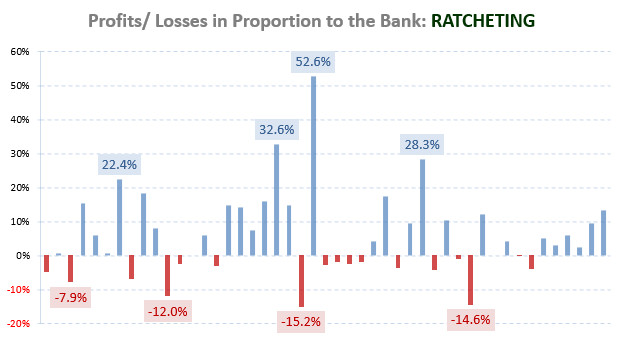
On Sunday, 5.2.2012, millions of football fans around the world witnessed Chelsea leading 3:0 at home after 57 minutes. They subsequently went on to gain nothing more than a draw from a position which had looked completely lost for their bitterest Premier League title rivals of the last decade.
Although the 3:3 draw at Stamford Bridge was a highly dramatic game for spectators, it was not a particularly surprising outcome from a statistical perspective. Soccerwidow explores why…
 Ryan Giggs and Ashley Cole at the
Ryan Giggs and Ashley Cole at theChampions League Final at Luzhniki Stadium
Moscow 21 May 2008
(Mitch Gunn | Shutterstock)
Following the match, the headlines are all in praise of United’s powers of recovery: “3-3 draw in a stunning comeback on Sunday”; “Manchester United’s dramatic comeback against Chelsea”.
Soccerwidow has checked the record books to see if such a result is in fact so unusual as it is not the first time in recent memory that a match has turned in such a fashion when United have been two or even three goals down.
Probably the most famous come-back etched into the memories of all football fans old enough to remember is of course the UEFA Champions League final of 1999, where United scored twice in added time at the end of 90 minutes to defeat Bayern Munich 2:1.
How often does an event like this actually happen?
Six of 55 matches Manchester United have played in all competitions since 1.1.2011 finished with noteworthy come-backs from losing positions. Discounting 13 home matches in which United did not concede a goal and 11 away games where they also kept a clean-sheet, the remaining 31 matches produced the six ‘recoveries’, equating to a statistically significant 19.35%!
This means that on average when Manchester United concedes a goal, almost every 5th match sees them recover against the odds from a losing position to grab an unlikely victory or a praiseworthy draw. In these situations, everyone would be well advised to consider laying in-play the team which is beating the Red Devils, should the lay odds be 1.19 or less, which is quite possible if the lead is 2:0 or even 3:0.
Surprises and unexpected comebacks since 1.1.2011:
- 25.1.2011: Blackpool vs Manchester Utd (Premier League)
Manchester United 2:0 down at half time; came-back to win 2:3 - 29.1.2011: Southampton vs Manchester Utd (FA Cup)
Manchester United 1:0 down at half time; came-back to win 1:2 - 2.4.2011: West Ham vs Manchester Utd (Premier League)
Manchester United 2:0 down at half time; came-back to win 2:4 - 22.5.2011: Manchester Utd vs Blackpool (Premier League)
Manchester United 1:2 down up to the 57th minute (half-time 1:1); came-back to win 4:2 - 7.8.2011: Manchester Utd vs Manchester City (Community Shield)
Manchester United was 0:2 down at half time; came-back to win 3:2 (neutral venue) - 5.2.2012: Chelsea vs Manchester Utd (Premier League)
Manchester United was 0:3 down up to the 57th minute; came back to draw 3:3
Can Anyone See a Pattern??
Since 01 January 2011, there have been only 12 matches where United were losing at half-time, but four of these occasions were turned around into victories, and one was drawn (five of 12 = 42% recovery rate from losing positions at half-time).
Conspiracy theorists are welcome to speculate but the enduring fact is that United is a team which, under Sir Alex Ferguson, never stops fighting until the final whistle. They are always good value with their collective backs against the wall and with the scent of a heroic performance in the team’s nostrils.
Other Notable Recoveries of Manchester United
Other noteworthy performances from Manchester United in recent years include being 2:0 down against Juventus in Turin during the 1999 Champions League semi-final. At that time, United were 3:1 down on aggregate, with the added baggage of an away goal against, and staring at certain elimination from the competition. Booked and certain to miss the final, their skipper, Roy Keane, inspired the come-back and United won the game 2-3, and thus the tie, 4-3 on aggregate.
Losing 3-0 at half-time against Tottenham Hotspur during the 2001-02 season, the Red Devils put five second half goals past the hapless lilywhites to win the game 3-5.
Despite being 2-0 down away to Everton in a must-win match during the finale to the 2006-07 Premier League season, United turned it around with four goals in the final 40 minutes, winning 2-4.
Tottenham Hotspur were again brave enough to take a half-time lead, this time 0:2 at Old Trafford during 2008-09, and once again, United responded with five goals in the second half to win the match 5:2.
Perhaps Chelsea’s downfall on the 5th February 2012 was the apparent ‘cockiness’ their players displayed after going 3:0 up. If there is anything more likely to produce a lashing-out response from a wounded animal, then taunting it is never recommended.
In whichever direction the Premier League title is eventually decided, the game Chelsea vs Manchester United looks to have been one of the more pivotal games of the season. It has once again suggested that doubters of Sir Alex Ferguson’s supposed ‘team in transition’, write-off their title challenge in favour of Manchester City’s at their peril!






